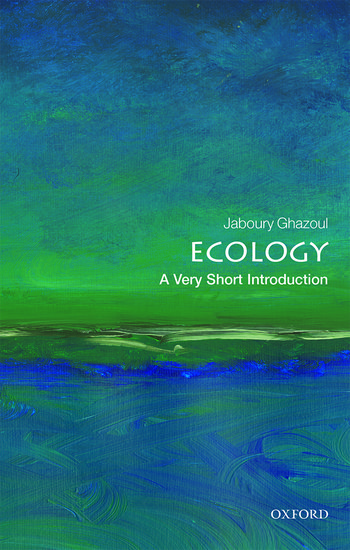Home >
A Very Short Introduction >
Ecology (Nature)
A Very Short Introduction | Nature
Ecology
ISBN: 9780198831013
Series: A Very Short Introduction
Ecology (Nature)
A Very Short Introduction Ecology (Nature) Media > Books > Non-Fiction > Education Books Expect Delays of Up to 4 Weeks| Order Below |
ISBN
9780198831013 (10-digit ISBN: 0198831013)
- Description
- Key Features
- Series Description
- Table of Contents
- Presents key ecological principles in the context of current environmental challenges
- Demonstrates ecological concepts with a lively range of examples
- Discusses the evolution of ecological thinking over time
- Considers the role of ecology in tackling future environmental issues
Understanding how our living environment works is essentially a study of ecological systems. Ecology is the science of how organisms interact with each other and with their environment, and how such interactions create self-organising communities and ecosystems. This science touches us all. The food we eat, the water we drink, the natural resources we use, our physical and mental health, and much of our cultural heritage are to a large degree products of ecological interactions of organisms and their environment.
This Very Short Introduction celebrates the centrality of ecology in our lives. Jaboury Ghazoul explores how ecology has evolved rapidly from natural history to become a predictive science that explains how the natural world works, and which guides environmental policy and management decisions. Drawing on a range of examples, he shows how ecological science can be applied to management and conservation, including the extent to which theory has shaped practice. Ecological science has also shaped social and cultural perspectives on the environment, a process that influences politics of the environment. Ghazoul concludes by considering the future of ecology, particularly in the light of current and future environmental challenges.
Oxford's Very Short Introductions series offers concise and original introductions to a wide range of subjects--from Islam to Sociology, Politics to Classics, Literary Theory to History, and Archaeology to the Bible.
Not simply a textbook of definitions, each volume in this series provides trenchant and provocative--yet always balanced and complete--discussions of the central issues in a given discipline or field. Every Very Short Introduction gives a readable evolution of the subject in question, demonstrating how the subject has developed and how it has influenced society. Eventually, the series will encompass every major academic discipline, offering all students an accessible and abundant reference library.
Whatever the area of study that one deems important or appealing, whatever the topic that fascinates the general reader, the Very Short Introductions series has a handy and affordable guide that will likely prove indispensable.
Please note: As this series is not ELT material, these titles are not subject to discount.
Preface
List of illustrations
1: What is ecology?
2: History of ecology
3: Principles and theories
4: The big questions
5: Applied ecology
6: Ecology in culture and politics
7: The future of ecology
Further reading
Index
Understanding how our living environment works is essentially a study of ecological systems. Ecology is the science of how organisms interact with each other and with their environment, and how such interactions create self-organising communities and ecosystems. This science touches us all. The food we eat, the water we drink, the natural resources we use, our physical and mental health, and much of our cultural heritage are to a large degree products of ecological interactions of organisms and their environment.
This Very Short Introduction celebrates the centrality of ecology in our lives. Jaboury Ghazoul explores how ecology has evolved rapidly from natural history to become a predictive science that explains how the natural world works, and which guides environmental policy and management decisions. Drawing on a range of examples, he shows how ecological science can be applied to management and conservation, including the extent to which theory has shaped practice. Ecological science has also shaped social and cultural perspectives on the environment, a process that influences politics of the environment. Ghazoul concludes by considering the future of ecology, particularly in the light of current and future environmental challenges.
Key Features
- Presents key ecological principles in the context of current environmental challenges
- Demonstrates ecological concepts with a lively range of examples
- Discusses the evolution of ecological thinking over time
- Considers the role of ecology in tackling future environmental issues
Series Description
Oxford's Very Short Introductions series offers concise and original introductions to a wide range of subjects--from Islam to Sociology, Politics to Classics, Literary Theory to History, and Archaeology to the Bible.
Not simply a textbook of definitions, each volume in this series provides trenchant and provocative--yet always balanced and complete--discussions of the central issues in a given discipline or field. Every Very Short Introduction gives a readable evolution of the subject in question, demonstrating how the subject has developed and how it has influenced society. Eventually, the series will encompass every major academic discipline, offering all students an accessible and abundant reference library.
Whatever the area of study that one deems important or appealing, whatever the topic that fascinates the general reader, the Very Short Introductions series has a handy and affordable guide that will likely prove indispensable.
Please note: As this series is not ELT material, these titles are not subject to discount.
EASY ORDER FORM
PRICES LISTED INCLUDE CONSUMPTION TAX
Price Before Tax:
¥1,790


